HAS-HUB INTERNATIONAL SEMINAR
2025 HAS-HUB INTERNATIONAL SEMINAR
16 OF OCTOBER 2025 – 11H00 LISBON (ZOOM) | 13H00 HELSINKI (ZOOM) | 20H00 SYDNEY (ZOOM)
Coorganised by Verónica Policarpo, ICS-University of Lisbon, and Maria Saari, University of Oulu.
This year, we count with the participation of two speakers: Dinesh Wadiwel and Kimberly Graham!
Link to join the seminar online here.
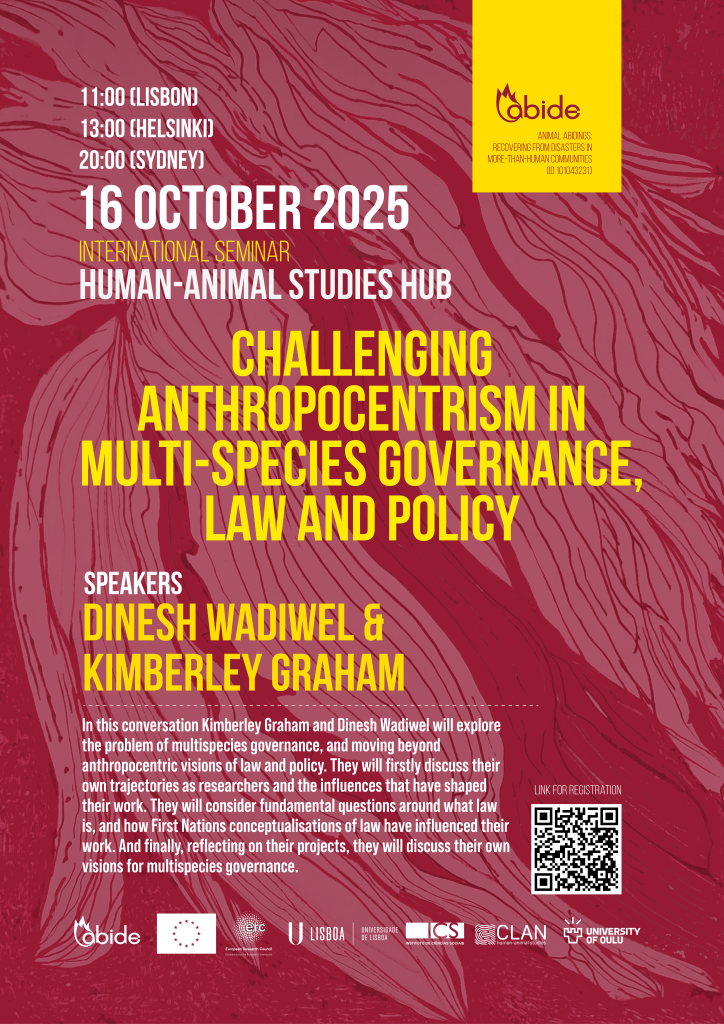
CHALLENGING ANTHORPORCENTRISM IN MULTI-SPECIES GOVERNANCE, LAW AND POLICY.
In this conversation Kimberley Graham and Dinesh Wadiwel will explore the problem of multispecies governance, and moving beyond anthropocentric visions of law and policy. They will firstly discuss their own trajectories as researchers and the influences that have shaped their work. They will consider fundamental questions around what law is, and how First Nations conceptualisations of law have influenced their work. And finally, reflecting on their projects, they will discuss their own visions for multispecies governance.
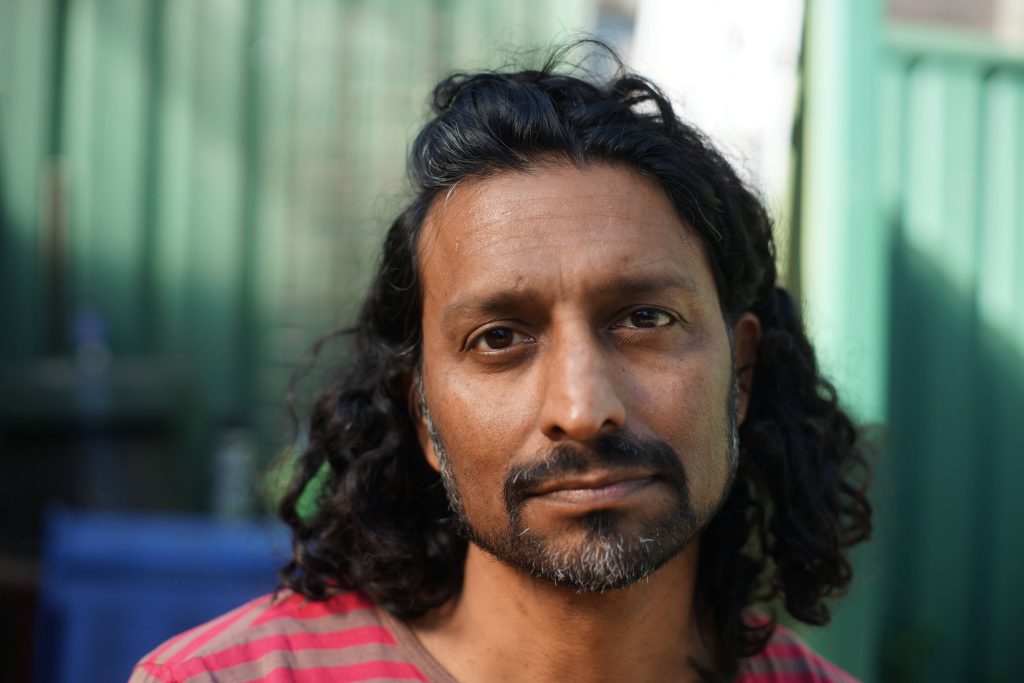
DINESH WADIWEL
Dinesh Wadiwel is Associate Professor in human rights and socio-legal studies at University of Sydney. He is author of Animals and Capital (Edinburgh UP, 2023), The War against Animals (Brill, 2015) and is co-editor, with Matthew Chrulew of Foucault and Animals (Brill 2016). Dinesh is also a disability rights researcher and was part of a team of researchers who have produced two reports for the Royal Commission into Violence, Abuse, Neglect and Exploitation of People with Disability. Dinesh is currently developing a book manuscript tentatively titled ‘Animals and the State.’
KIMBERLY GRAHAM
Kimberley Graham is an interdisciplinary scientist interested in less-anthropocentric and collaborative ways to work in partnership with animals and nature. Her legal research is published in Environmental Rights Review, The International Journal of Marine and Coastal Law, The Journal of International Law of Peace and Armed Conflict, Journal of International Wildlife Law & Policy, and a chapter in Rights of Nature in Europe: Encounters and Visions (Routledge 2024). Kimberley was a member of the research teams who prepared reports on behalf of the International Union for the Conservation of Nature to the United Nations (UN) International Law Commission, and the Global Network for Human Rights and the Environment to the Special Rapporteur on Climate Change: both informed the UN General Assembly, and she was an Expert Reviewer for the Intergovernmental Panel on Climate Change 6th Assessment Report. Kimberley is also an artist: inviting water bodies as living beings into co-creativity, as featured in Cycles of Hope: Voices of Regeneration and Confluence: Weaving Rivers.
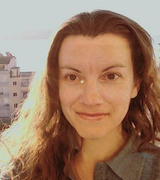
HAS-Hub International Seminar
Joint session with Envisioning Sustainability Hub
4 of june 2024 - 17h00 Lisbon (zoom) | 9h00 Eugene (zoom) | 19h00 Oulu (zoom)
This year, we were honoured to have with us Carol Gigliotti, from Emily Carr University of Design, Vancouver, BC. Canada, to talk about her work on animals’ creativity and cultures.
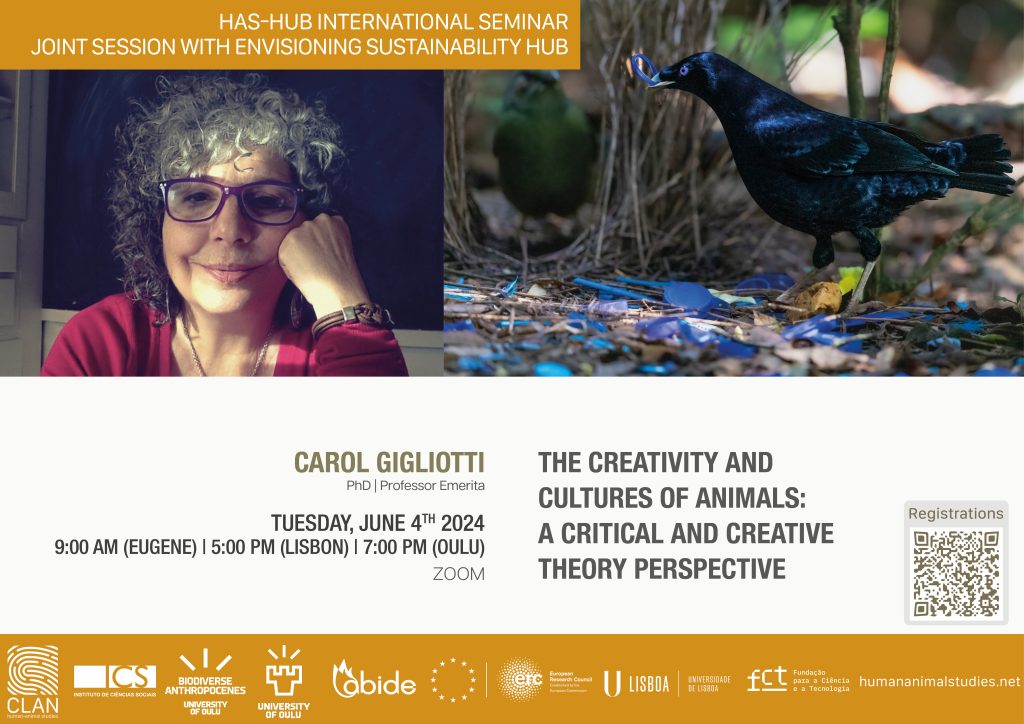
The Creativity and Cultures of Animals: A critical and creative theory perspective.
That animals are individuals, often recognized throughout history, is still one of the most subversive and dangerous ideas in human culture. The widespread forms of capitalism and their insistence on the use of animals as human property have intensified their use, even as the resultant devastation of this planet continues. Time is not on the side of animals, or us. How can we not only acknowledge the creativity and cultures of all kinds of animals, but also implement this knowledge in attempts to stop those uses and devastation? New research on animal creativity and cultures has opened the door to a more complex understanding of the self-aware capabilities of animals to make choices that direct the path of their lives. Many qualities, previously thought only to exist in humans, dynamically contribute to how individual animals make meaning for themselves, their families, communities, geographic populations, and species. Communicating these qualities can only help to undermine the long held belief that only human animals have inherent value and own this planet, a belief on its way out.
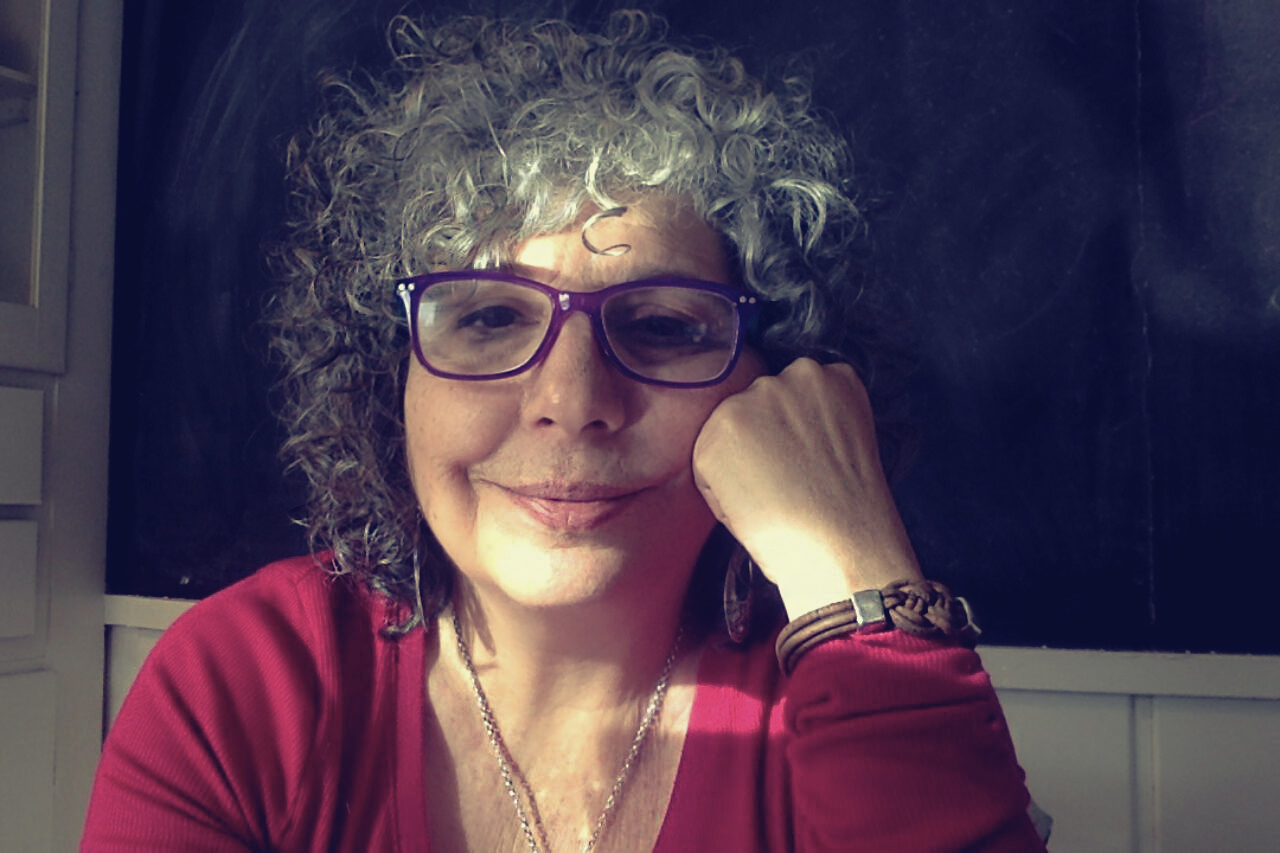
keynote speaker: Carol GIgliotti
Emily Carr University of Design
Carol Gigliotti is an author, artist, animal activist, and scholar whose work focuses on the reality of animals’ lives as important contributors to the biodiversity of this planet. She is Professor Emerita of Design and Dynamic Media and Critical and Cultural Studies at the Emily Carr University of Design, Vancouver, BC. Canada. Her book, The Creative Lives of Animals, (NYU Press, 2022) challenges the current assumptions of creativity, offering a more comprehensive understanding through recognizing animal creativity, cognition, consciousness, and agency. The book was a Nautilis Gold Award Winner in the Animal and Nature Category in 2023. She is the editor of the book, Leonardo’s Choice: Genetic Technologies and Animals (Springer, 2009) and the author of many book chapters and journal essays on our relationships with animals.
HAS-Hub International Seminar
Joint session with Envisioning Sustainability Hub
1st June 2022 - 2:00 pm Lisbon (Zoom)
This year, we are honoured to have with us Jeff Sebo, from the New York University, to talk about “Multispecies justice, resilience, and sustainability”. Online event, on Zoom. Registration is free though mandatory. Register here: https://videoconf-colibri.zoom.us/meeting/register/tZEkf-yhrT4vEtRAIpa85fwotzasvKyGjVOw
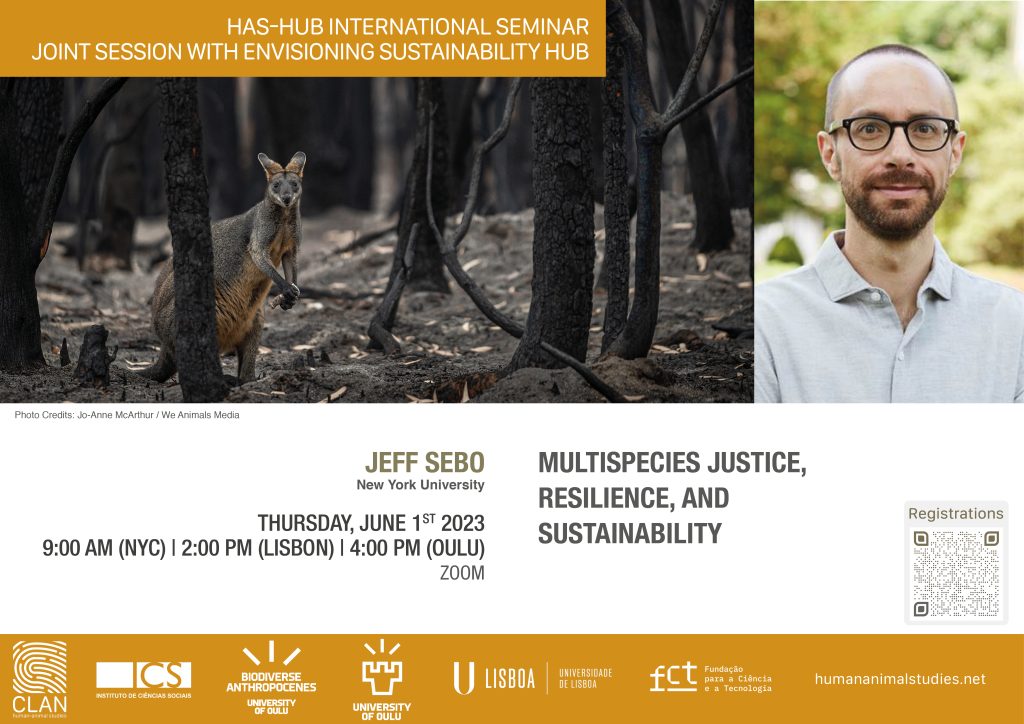
Multispecies justice, resilience, and sustainability
Human and nonhuman fates are increasingly linked. Our use of animals contributes to pandemics, climate change, and other threats which, in turn, contribute to biodiversity loss, ecosystem collapse, and nonhuman suffering. As a result, we have a moral responsibility to include animals in health and environmental policy, by reducing our use of them as part of our pandemic and climate change mitigation efforts and increasing our support for them as part of our adaptation efforts. Applying and extending frameworks such as One Health, the Green New Deal, and Sustainable Development, this talk calls for reducing support for factory farming, deforestation, and the wildlife trade; increasing support for just, healthful, and sustainable alternatives; and considering human and nonhuman needs holistically, structurally, and comprehensively. This talk also considers connections with legal status, political status, social services, infrastructure, and other topics.

INVITED KEYNOTE: Jeff Sebo
New York University
Jeff Sebo is Associate Professor of Environmental Studies, Affiliated Professor of Bioethics, Medical Ethics, Philosophy, and Law, Director of the Animal Studies M.A. Program, Director of the Mind, Ethics, and Policy Program, and Co-Director of the Wild Animal Welfare Program at NYU. Jeff is author of Saving Animals, Saving Ourselves (2022) and co-author of Chimpanzee Rights (2018) and Food, Animals, and the Environment (2018). He is also an executive committee member at the NYU Center for Environmental and Animal Protection, a board member at Minding Animals International, a senior research fellow at the Legal Priorities Project, and a mentor at Sentient Media.
HAS-Hub International Seminar
Joint session with Biodiverse Anthropocenes
7th June 2022 - 10am Lisbon-BST
This year, we are honoured to have with us Danielle Celermajer, from the University of Sydney, to talk about “Imaging, narrating, institutionalising and realising multispecies justice”. Online event, on Zoom. Registration is free though mandatory. Register here: https://videoconf-colibri.zoom.us/meeting/register/tZEkf-yhrT4vEtRAIpa85fwotzasvKyGjVOw
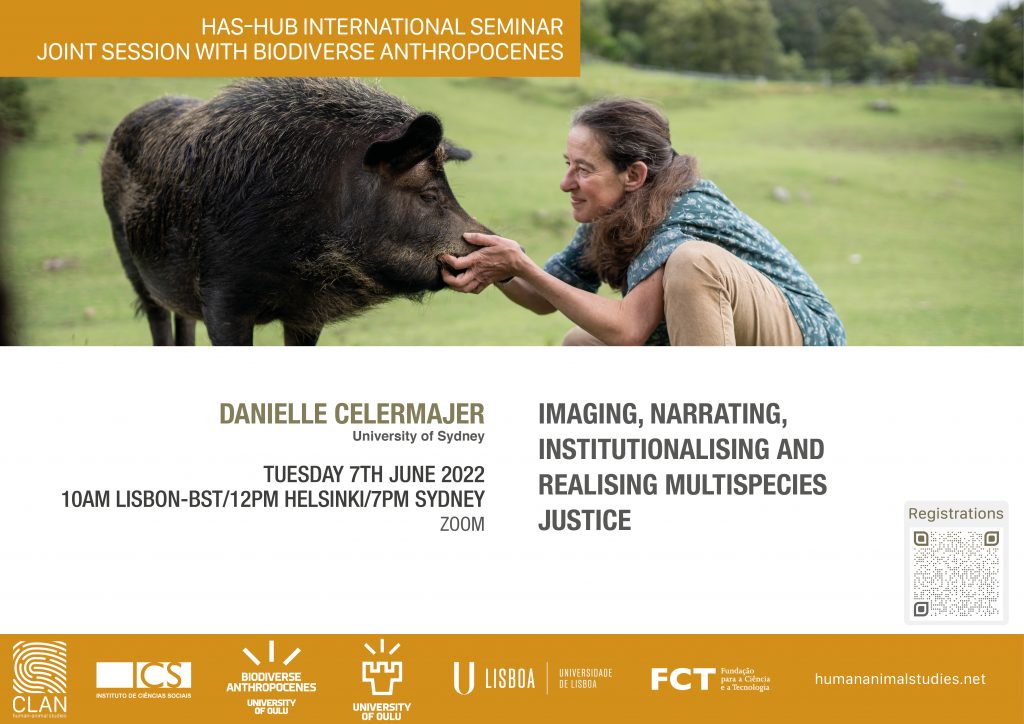
Imaging, narrating, institutionalising and realising multispecies justice
The distinction between humans and all other beings has been foundational to the institutions of political, economics, law, knowledge and narration that have dominated the modern west. Multispecies justice belongs to a family of frameworks that are seeking to simultaneously deconstruct this foundational geography and imagine alternative ways of knowing, being and living together better equipped to support the flourishing of all earth beings. Given the doxic character of anthropocentrism, this task demands an ecology of approaches, synthesising strategies of narration and institutional transformation. In this talk, I will explore the challenge of multispecies justice and some of the paths scholars might forge to realise it.
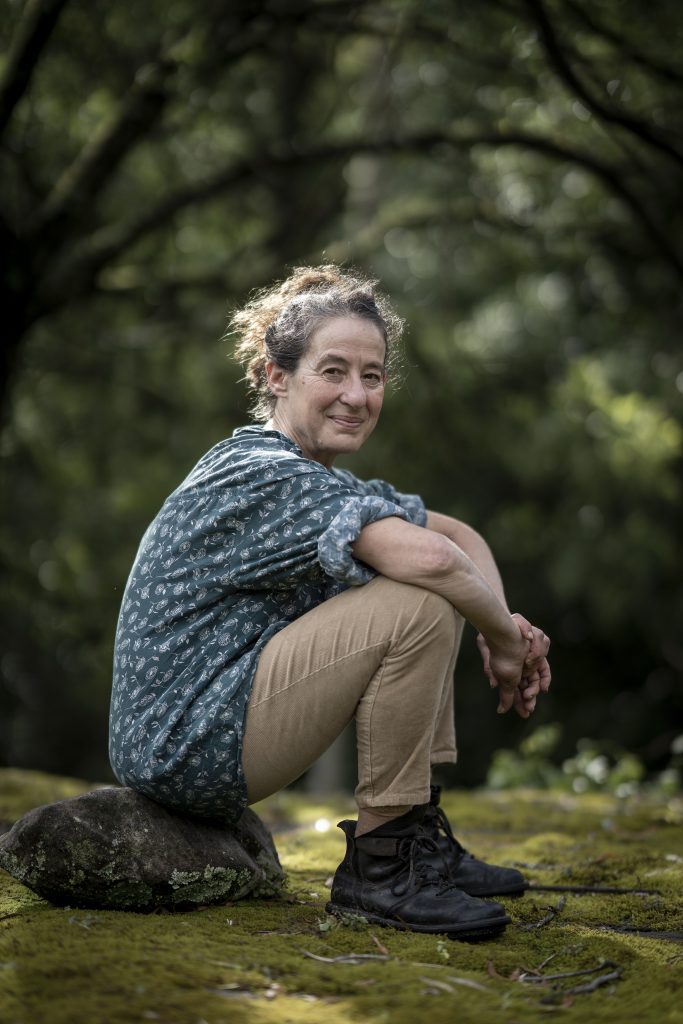
Invited Keynote: Danielle Celermajer
University of Sydney
Danielle Celermajer is a Professor of Sociology and Social Policy at the University of Sydney, Deputy Director of the Sydney Environment Institute and lead of the Multispecies Justice project. A longtime human activist, before joining the academy she was head of Indigenous policy at the Australian Human Rights Commission and worked in grass roots democratization and human right movements in Central America. As a human right scholar, her books include Sins of the Nation and the Ritual of Apology and The Prevention of Torture: An Ecological Approach (both with Cambridge University Press 2008 and 2018), with Richard Sherwin, A Cultural History of Law in the Modern Age (Bloomsbury 2019), with Alex Lefebvre, the Subject of Human Rights (Stanford University Press 2020), and with Moira Gatens and Millicent Churcher, Institutional Transformations: Imagination, Embodiment, and Affect (Routledge 2021).
In recent years she has turned her attention to injustices and violence against the more than human. Through the experience of living through the black summer bushfires with a multispecies community, she began writing about a new crime of our age, Omnicide. Her latest book, Summertime (Penguin Random House, 2021) was written in recognition of the critical urgency of conveying the complex conceptual recognition of the multispecies harms of the climate catastrophe in ways that can provoke affect and hence action.
HAS-Hub International Seminar
9 June 2021 at 10am Lisbon/London time (Zoom)

A cat amongst the pigeons: becoming an audience member for a childhood publics
Geographer Clive Barnett (2014) has described public life as ‘a family of practices of sharing with others’ and has argued that any analysis of transformations to the institutional configuration of publics must pay close attention to ordinary contexts of everyday life and to seriously consider what matters to people, engaging with what he calls ‘vocabularies of worth’. In this presentation, I focus on children’s ‘vocabularies of worth’ that emerged in a three-country study on children’s everyday lives and their encounters, experiences and engagement with public life, as those related to the animals in their lives, in their neighbourhoods and cities, and in their imaginations. Through a reflexive analysis of the study’s multimodal ethnography and our public engagement activities, I focus on the figure of the audience for a childhood publics. In childhood studies, the case has long been made for listening to children but less attention is paid to who does the listening, what sort of audience member they might need to be, and how they might need to ‘pay attention’ in order for children’s voices to resonate as intended. The presentation explores the many different ways in which animals were part of the lexicon of children’s vocabularies of worth. I argue that attention in the field and in analysis was commanded through noise and antihistamines, as well as encounters with pigeons, cats and caterpillars (and dogs and peacocks and elephants and fish and meerkats and dolphins… and… and… ), and their representations in children’s photo-stories, poetry, and drawings. A tentative and provisional conclusion is reached that an audience for a childhood publics is one whose members allow themselves to become ‘undone’, and in so doing rediscover their childish ways again.
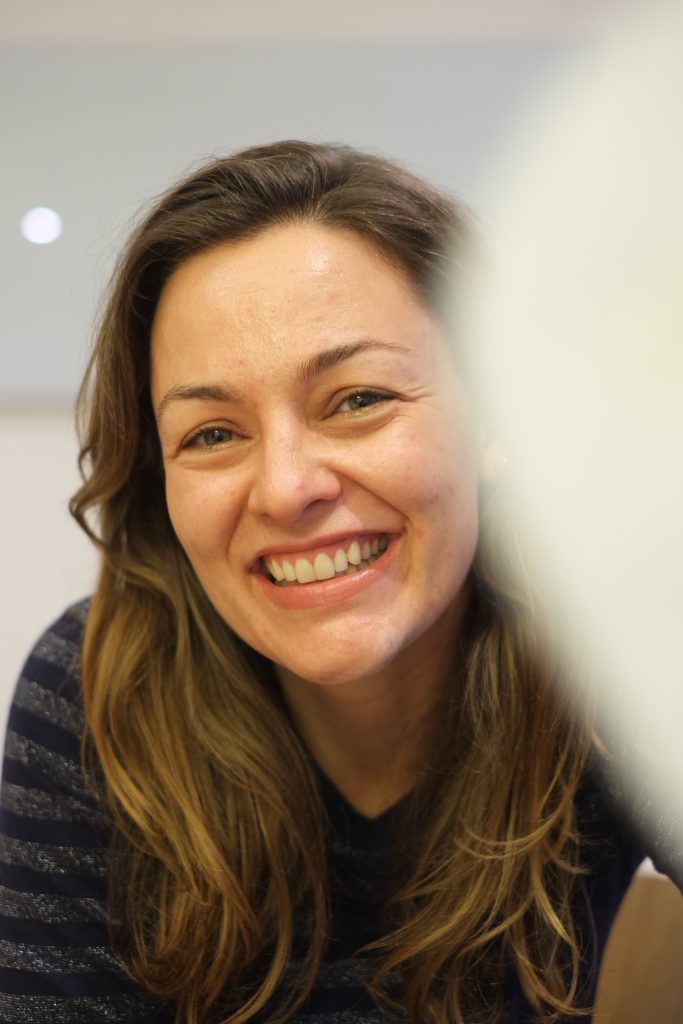
Invited Keynote: Sevasti-Melissa Nolas
Goldsmith, University of London
Melissa Nolas teaches in the Department of Sociology at Goldsmiths, University of London. She is the co-director of the research programme Childhood Publics and of the Children’s Photography Archive. She also co-edits the online journal entanglements: experiments in multimodal ethnography. Her most recent research focuses on the relationship between childhood and public life, multimodal ethnography, and publics creating methodologies. Prior to this she spent a number of years critically researching welfare, well-being and social support for children, young people, and women/mothers.
Seminário de Abertura – Animais, Literatura e Artes
22 de Setembro 2020 - 18h00 - ICS-ULisboa (Zoom)
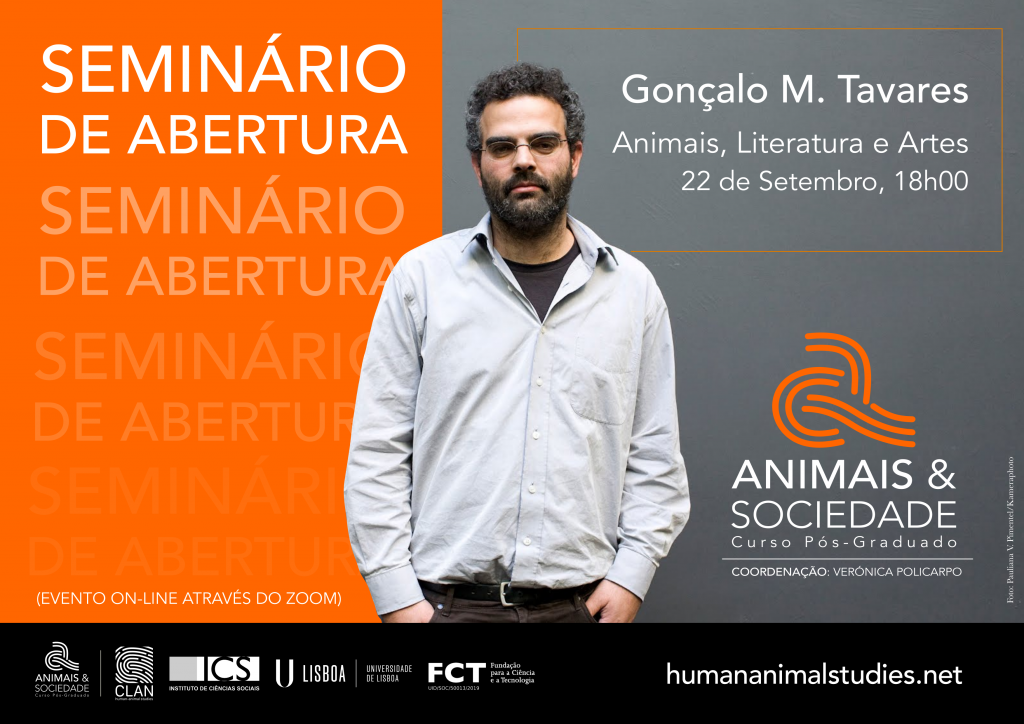
Gonçalo M. Tavares
FMH-ULisboa
Gonçalo M. Tavares, escritor português e professor universitário na Faculdade de Motricidade Humana, nasceu em 1970. Os seus livros deram origem, em diferentes países, a peças de teatro, peças radiofónicas, curtas metragens e objectos de artes plásticas, vídeos de arte, ópera, performances, projectos de arquitectura, teses académicas, etc.
Em Portugal recebeu vários prémios entre os quais o Prémio José Saramago 2005 e o Prémio LER/Millennium BCP 2004, com o romance – “Jerusalém” (Caminho); o Grande Prémio de Conto da Associação Portuguesa de Escritores “Camilo Castelo Branco” com “água, cão, cavalo, cabeça” 2007(Caminho). Prémio Branquinho da Fonseca/Fundação Calouste Gulbenkain com “O Senhor Valéry”, Prémio Revelação APE com “Investigações. Novalis”. Prix du Meuilleur Livre Étranger 2010 (França). Prémio Fernando Namora 2011 com “Uma viagem à Índia”. Prémio Virgílio Ferreira 2018.
HAS@ICS-ULisboa 2019 – Children-Animals Relationships
6 June 2019 - 10h00 - ICS-ULisboa, Room: Polivalente
Rabbits and Children: A Complicated History
This talk will look at the history of rabbits and children—a relationship that we take for granted today, but that is much more complicated than it appears.
The talk will cover the origins of the rabbit/child connection in the myths and symbols of cultures around the world, many of which play on the rabbits’ biological propensity for reproduction.
Those myths evolved into, for example, the centrality of the rabbit in children’s Easter celebrations, the dominance of rabbits as the subject of children’s stories and toys, the boom in rabbit breeding during the Victorian era, and ultimately, the concept of the rabbit as a children’s or “starter” pet for families around the world.
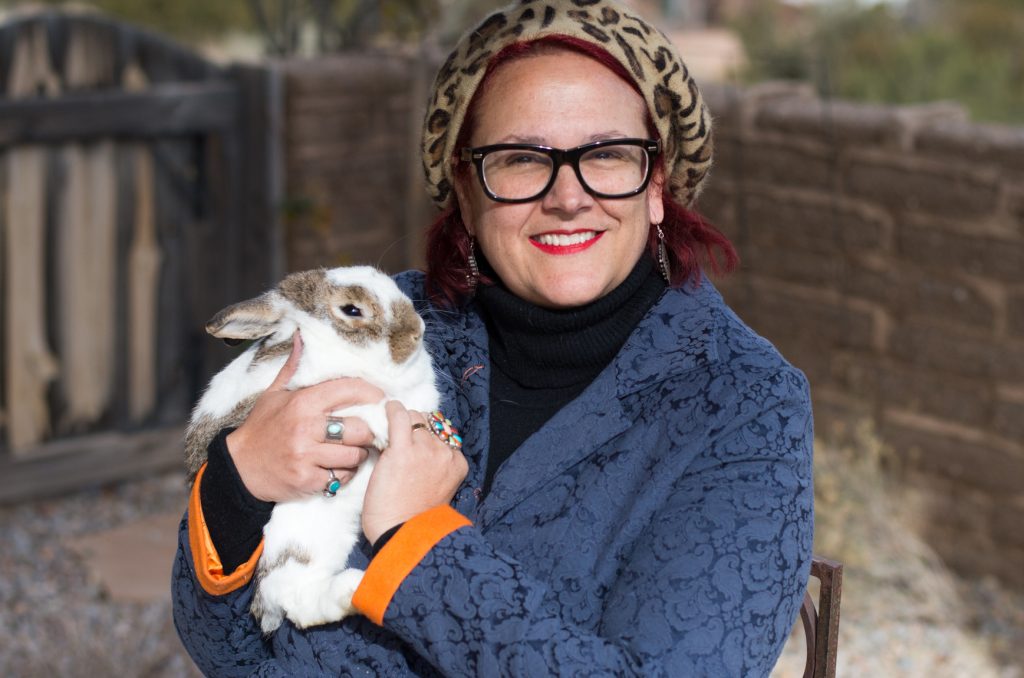
Support by:

Oradora convidada: Margo de Mello
Animals & Society Institute, USA
Received her Ph.D. in Cultural Anthropology from U.C. Davis in 1995. She is an Adjunct Professor at Canisius College in the Anthrozoology Masters Program, and the Program Director for Human-Animal Studies at the Animals and Society Institute. Her books include Bodies of Inscription: A Cultural History of the Modern Tattoo Community (2000), Stories Rabbits Tell: A Natural and Cultural History of a Misunderstood Creature (2003), Low-Carb Vegetarian (2004), Why Animals Matter: The Case for Animal Protection (2007), The Encyclopedia of Body Adornment (2007), Feet and Footwear (2009), Teaching the Animal: Human Animal Studies Across the Disciplines (2010), Faces Around the World (2012), Animals and Society: An Introduction to Human-Animal Studies (2012), Speaking for Animals: Animal Autobiographical Writing (2012), Inked: Tattoos and Body Art around the World (2014), Body Studies: An Introduction (2014), and Mourning Animals: Rituals and Practices Surrounding Animal Death (2016).
